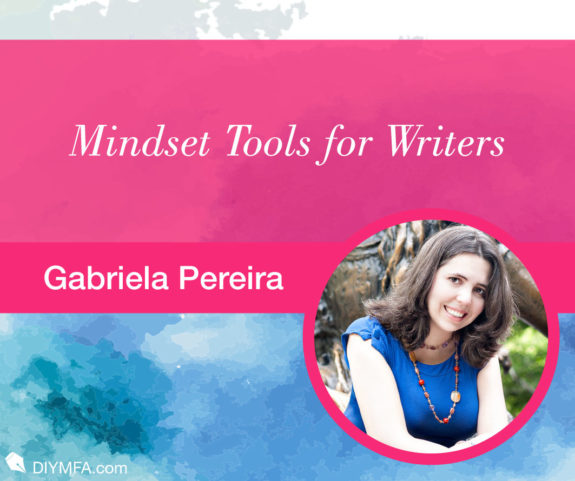[Part of this post was originally published in January 2014 here and another part of it was originally published in April 2017 here.]
The new year always makes me want to reevaluate my creative process and push myself to become a more productive writer. This year is no different. As I’ve been thinking about creativity, I’ve begun evaluating my mindset as a creative person.
I’ve realized that there are certain components that make up the mindset of a writer. First, you must have a willingness to experiment and try new things through the process of iteration. You have to reframe concepts of success and failure and view them more as part of the process. And, you have to realize that word choice matters; the things we tell ourselves about ourselves and our work matter.
The Key to Success and Productivity is Iteration
What’s iteration? Simply put, it’s when you keep trying things out and tweaking your process until you get it right. This approach is huge in the tech startup world, where programmers develop rudimentary Beta versions and continually improve the product in subsequent updates. We think nothing if a piece of software creates an update to fix bugs and other problems, yet as writers we often beat ourselves up for the slightest imperfections, both in our writing projects and in our process itself.
I’m here to tell you that it’s OK to be imperfect. It’s OK to mess up. It’s OK to try different things and explore brand new ideas. Go ahead, try a writing technique out and if it doesn’t work, just ditch it and try something else.
There are two sides to iteration. The first is we must be persistent and keep writing, even when it’s hard or painful and crafting each word feels like pulling teeth. On the flip-side, though, iteration also means letting go of habits or techniques that aren’t working for you. As writers, we sometimes fall into the trap of thinking that just because a certain technique worked for another great writer, it should work for us. Then when that technique doesn’t work, we feel like there’s something wrong with us because that other writer’s method didn’t take.
For example, when I read Stephen King’s memoir On Writing, I was very shaken by the part where he talks about his writing and reading habits. According to King, a “real writer” must write 2,000 words per day and read upwards of 80 books in a year. I tried following his advice, really I did. And I failed miserably and felt horrible about my writing.
That was when it hit me that Stephen King’s writing habits might work for Stephen King, but that didn’t necessarily mean they would work for Gabriela Pereira or any other writer for that matter. I realized that I needed to test out my own writing habits and find something that worked for me.
After that, with a long-time process of trial and error, I discovered that I write best in the late morning and late afternoon, that I do my best work with headphones on and music blaring, and that I need short, contained blocks of time. For reading, I’ve found that 25-30 books per year is my “sweet spot” and that I love reading on public transit or late at night under the covers with a book light (like I did when I was a kid). Without iteration, I’d probably still be mentally flogging myself for not writing 2,000 words per day and reading 80+ books per year.
Why Does Iteration Work?
The answer is twofold. First, iteration makes you mindful of your work habits and writing process. It also pushes you to adopt a meta-view about your writing, which can lead to more objectivity. Let’s delve into these three reasons further, shall we?
You become a more mindful writer.
When you iterate and test out different aspects of your writing process, it pushes you to become a more mindful writer. Mindfulness and meditation are techniques that I’ve been exploring, both in my writing life and my real life over the years. The idea of mindfulness is to become aware of your mind—to observe your thoughts and where they go—but then to be able to let them go.
When you practice iteration in your writing process, it makes you more aware of your habits: both what works and what doesn’t. As you iterate and observe your habits, you’ll become better able to shape your process and become more a more effective and productive writer.
You adopt a meta mindset.
This goes hand-in-hand with mindfulness. When you iterate and test your process, it pushes you to adopt a meta-view of your writing. This creates a certain distance between you and your work, distance that can help you gain a more objective perspective about your project.
We writers can get very emotionally involved with our writing. Our characters become like close friends and the world of our writing becomes a private sanctuary. When it comes time to evaluate our work, this emotional connection makes us very biased. When we embrace iteration as part of our writing process, it creates a disconnect between us and our writing and this makes it easier to be objective with our decisions.
Reframe Success and Failure
“Ever tried. Ever failed. No matter.
Try again. Fail again. Fail better.”
~Samuel Beckett
This is one of my favorite quotes because it gets at the heart of what iteration is all about. In order to iterate, we must embrace failure and mistakes as a central part of our creative process. Failure is not some big, scary thing. It’s part of the game. I like to think of it as sort of like playing golf. I’ve tried to learn, but when it comes to hand-eye coordination, I’m hopeless. Many of my cousins and other relatives play, so I grew up hearing a lot of golf talk.
Here’s the thing: the whole idea with golf is getting the lowest possible score. You would think, then, that the ultimate victory–the epitome of perfection (at least in theory)–would be to score a “zero.” Here’s the catch: if you score a “zero” that means you didn’t actually play the game. The minute you step out onto the tee and take your first swing, you’re getting an imperfect score. Failure and imperfection are built into the premise of the game. In order to play, you have to fail.
We need to embrace failure as being a core part of the creative process, just as it is a core part of playing golf. When we fail, let’s celebrate and embrace that fact. It means we’re out there, playing the game and doing the work.
Word Choice Matters
One of our superpowers as writers is our massive vocabulary. This gives us the power to choose the word and the meaning that we apply to our lives and our writing. Thomas Edison once said, “I have not failed. I’ve just found 10,000 ways that didn’t work.” This reframing is key.
You may have heard me ask in webinars who is an aspiring writer. Lots of people raise their hands. But really, it’s a trick question. No one is an “aspiring” writer. If you write, you are a writer. Period. End of story. It’s a telling fact that so many of us need to qualify our status as writers by calling ourselves “aspiring.” In fact, I’ve found this is true with most creative careers, where we’ll hear people say they are aspiring actors or musicians, but we never hear someone call themselves an “aspiring plumber” or an “aspiring neuroscientist.”
I share this anecdote to underscore the power of words, even if those words seem inconsequential. Whether we tack on the dreaded a-word when we call ourselves writers, is only the tip of the iceberg. The truth is, every word matters, and when we talk about ourselves, those are often the most influential words of all. What we tell ourselves about our writing not only shifts our perspective about the work itself but shades how we view ourselves as creative people.
My challenge for you today is to think—really think—about the words you use when you talk about yourself, your life, your creative process, and even your health, either physical or mental. Strip those words down to their barest essentials. Try to understand that deeper meaning behind them.
Then choose one word or short phrase and rewrite it. Use different words. Be deliberate.
We are working behind the scenes at DIY MFA on a new program that focuses on mindset for writers. If you want to stay in the loop, sign up here to get emails as we release more information.

Gabriela Pereira is an author, speaker, and entrepreneur who wants to challenge the status quo of higher education. As the founder and instigator of DIYMFA.com, her mission is to empower writers, artists and other creatives to take an entrepreneurial approach to their education and professional growth.Gabriela earned her MFA in writing from The New School and speaks at college campuses and national conferences. She is also the host of DIY MFA Radio, a popular podcast where she interviews bestselling authors and book industry professionals and author of the book DIY MFA: Write with Focus, Read with Purpose, Build Your Community.







